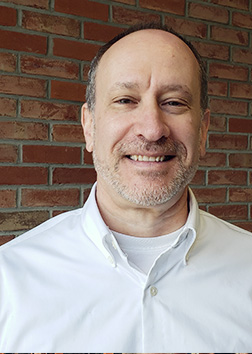The spring semester at SUNY Jamestown Community College is underway on the college’s physical campuses, and at Collins Correctional Facility.
Now in its third semester, the program has seen growth in the number of incarcerated individuals participating, courses being offered, and instructors ready to provide them.
Reid Helford, prison education coordinator, is in his first year with JCC and his second decade of working and teaching within corrections systems. His work in Washington State corrections began with going from cell-to-cell with a whiteboard and teaching through a small window, to leading programs and teaching in one of the first classrooms in the nation for incarcerated individuals in solitary confinement.

“I have a really strong investment and understanding of reentry and desistance from crime,” Helford said. “The classroom is a sacred place where we learn from each other and where we feel safe to learn together.”
Collins has been an active and receptive partner in creating a safe learning space that has seen growth in student interest. The program began with 10 incarcerated individuals enrolled in the first semester, and has grown to 30 for this spring.
“The average in the state is about 45,” Helford said. “I think we’ll hit that next fall. Relationships move at the speed of trust, and that’s what we’ve been building. The incarcerated individuals have to trust that there’s value in the program, build trust that they are able to complete the program, and do well in class.”
Instructors teaching in the program have increased too – from three in the first semester to six this spring. In all, 11 have taught courses at Collins. John Brantingham teaches English at the facility for JCC. He says that in his career he has taught students dealing with circumstances such as homelessness and food insecurity. While incarcerated students have experienced similar trauma, there are some differences.
“Students at Collins are exceptionally literate,” Brantingham said. “They read whatever is in front of them, and their writing is really good. They’re also incredibly dedicated because this is something they had to work hard to get to do.”
In order to be accepted into the program, incarcerated individuals must show initiative and consistency in modeling nonviolence and respect in the jail. Brantingham was the director of the honors program at his previous college, and said that he finds incarcerated students similar to honors students in that they are consistently prepared for class and excited to learn.
“All of these students have a great deal of life experience so when they start to write something, it’s fascinating,” Brantingham said. “They’re the best students, you know, and I think that defies the expectations of some people.”
Helford explained that transparency in teaching and classroom expectations is key in creating a learning environment in which students will continue to defy expectations. He works to set professors up for success before they begin their classes, and the results have been favorable for all.
“I think it’s an experience that has been really positive for just about every professor,” Helford said. “I prepare most professors with at least a short discussion and some reading to do about trauma-informed classroom practices. The men often come in with significant amounts of trauma. We want the classroom to be a place that recognizes that.”
Helford says this semester offers the widest range of courses so far, including English, business marketing, sociology and environmental science.
“It’s enough that our students have some choice,” Helford said. “It’s not always easy to provide, but I think it’s important for them to feel like they have some control in their educational choices.”
Choice helps to build student retention, as does creating a path for students to continue their education or pursuit of a career. Incarcerated individuals whose terms don’t allow for them to earn a degree still benefit from having completed classes and having built an identity other than “criminal” to carry with them back to society. Being able to continue their education online or through another SUNY school allows for a gentle transition out of prison.
“We offer them a chance to be an intellectual, the chance to be a student… someone who’s smart,” Helford said. “These are things they probably haven’t thought about themselves before.”
Helford says there’s more in the works for the program. Bringing JCC Career Services offerings into the prison and tracking student progress once they are released are ways to further ensure recidivism rates decline.
“This program really is exciting and Reid has done such a fantastic job,” said Crystal Rose-Williams, assistant vice president of Academic Affairs at JCC. “We’re seeing our ability to change lives, which is why we got involved in the program to begin with. It’s great to see educational programs like IGNITE coming to the Chautauqua County Jail, as we continue to explore opportunities to diversify our offerings.”

